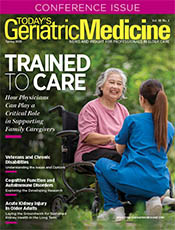
Spring 2025
Spring 2025 Issue Editor’s Note: Remembering the Overlooked Can you believe it’s spring already? It’s amazing how the days can so easily become a blur, but in the hectic day-to-day, it’s easy to miss some things, including the changing calendar! That’s why it’s important to remember not to ignore the daily details. Whether it be remembering to make a team note for an upcoming meeting, greeting colleagues in the mornings, or simply finding time to check in with yourself during the day, sometimes little things slip through the cracks. However, staying mindful of events just outside of the present can make all the difference. This issue examines these often-overlooked symptoms, needs, and people who might get lost in the hustle and bustle of the here and now. Our cover story takes a look at the growing dependency of family caregivers for the aging population and the need for health care workers to set them up for success. In “Trained to Care,” Heather Rose Artushin, LISW-CP, breaks down the challenges inherent in the caregiver role. From becoming familiar with the difficulties the aging process presents to learning microskills that can help the day-to-day interactions run more smoothly, as well as support systems such as Medicare B that might provide the necessary tools for successful caregiving, often people don’t know what they don’t know, and health care providers need to be intimately familiar with their educational needs. In addition, Lindsey Getz, in her feature “Cognitive Function and Autoimmune Disorders,” discusses that small details can make a significant difference in patient outcomes, especially when assessing sudden cognitive changes. Autoimmune conditions, often overlooked in older adults, may contribute to cognitive decline, yet standard tests like MRIs or spinal fluid analysis might not reveal abnormalities. Recognizing subtle symptoms—such as brain fog or misplaced objects—can prompt timely intervention. Understanding the intricate relationship between immune function and brain health allows health care providers to advocate for further evaluation, ensuring that reversible causes of memory loss are not missed. In her article, “Balancing the Minutes,” Elizabeth S. Goar confronts the ever-mounting daily responsibilities of those in health care and the emerging technology that might streamline the day and help save some time for other important needs. Finally, other articles examine the trials faced by veterans with chronic disabilities and the supports in place to help, the importance of early interventions for acute kidney injury in older populations, probiotics’ understated benefits in gaining diets, how technology is helping reshape elder care, and considering nonpharmacological and pharmacological approaches for chronic pain management. Enjoy the issue! — Chris Baldwin |
